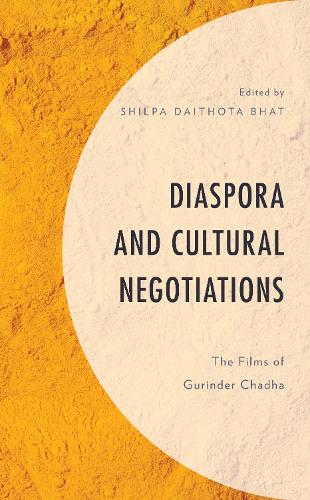
Diaspora and Cultural Negotiations: The Films of Gurinder Chadha
(Hardback)
Publishing Details
Diaspora and Cultural Negotiations: The Films of Gurinder Chadha
By (Author) Shilpa Daithota Bhat
Contributions by Lauren Bettridge
Contributions by Shilpa Daithota Bhat
Contributions by Susan Flynn
Contributions by Cristina M. Gmez-Fernndez
Contributions by Reshmi J. Hebbar
Contributions by Lara V. Kattekola
Contributions by Izabella Kimak
Contributions by Alejandra Moreno-lvarez
Contributions by J. Sunita Peacock
Bloomsbury Publishing PLC
Lexington Books/Fortress Academic
30th March 2022
United States
Classifications
Professional and Scholarly
Non Fiction
Asian history
Media studies
791.430233092
Physical Properties
Hardback
246
Width 161mm, Height 227mm, Spine 21mm
553g
Description
Diaspora and Cultural Negotiations: The Films of Gurinder Chadha explores critical and theoretical conceptualizations of identity, globalization, intersectionality, and diaspora, among other topics, in the films of Gurinder Chadha. This book argues that Chadhas work offers relevant and sensitive portrayals of the members of the diaspora community that make these films of contemporary and enduring value, highlighting their challenges in hybridization and acculturation in the societies they migrate to and the historical and political exigencies that influence their everyday existence. Contributors analyze Chadhas films in the context of cultural milieus including multiculturalism, narration and representation, ethnicity, literary adaptation, and intercultural negotiations, while also exploring Chadhas own role as an auteur. Scholars of film studies, Indian cinema, diaspora studies, sociology, and cultural studies will find this book particularly useful.
Reviews
Gurinder Chadha's negotiation of multicultural spaces that are specific as well as representative has been critically examined in Shilpa Daithota Bhat's collection of critical essays, Diaspora and Cultural Negotiations: The Films of Gurinder Chadha. This is a first of its kind and offers many insightful, critically valued observations on Chadha's contribution to cinema, not only as a mode of entertainment but as an 'international language' that breaks barriers and traverses across terrains on identity, diaspora and culture. This collection is important not only because of its contribution to the existing dialogue on diasporic identity and its representation in cinema, but also because it explores how history, politics and global cultures affect human experience and memories.
This book is a remarkable work of diasporic scholarship of Chadha's cinematic representations. It examines the multifarious themes of migration through films and documentaries. Chadha's execution of the diasporic reality into reels is reviewed and critiqued through a theoretical lens by renowned scholars worldwide. The book traverses the borders and boundaries and navigates through cross-cultural spaces, multicultural negotiations, etc. This book marks a trend in the field of diaspora and media and it is strongly recommended.
Widely admired across the globe for her visual and cultural productions, Gurinder Chadha is among the pioneering voices of the diaspora. A book-length critique on this domain was eagerly awaited in international academia, and Shilpa Daithota Bhat has filled this lacuna by bringing Chadha scholars together on one platform through this book. Every essay in this book is seminal and different in terms of text, context, and criticism. This collection shall be a great treasure, as well as a guiding force, for academics working in the field of film studies.
Author Bio
Shilpa Daithota Bhat is assistant professor at Ahmedabad University in Gujarat, India.
